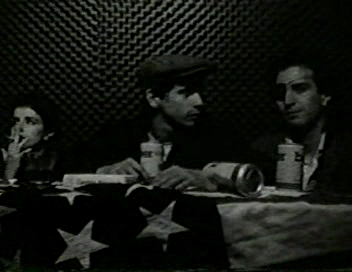Tuesday, February 01, 2011
 11:17 PM |
The Roots of Araki
11:17 PM |
The Roots of Araki
I recently stumbled on two of Gregg Araki's rare-to-get films, and wasted no time in screening them, being the completist that I am. I've always enjoyed Araki's ouevre. His filmmography consists of a unique cinematic vision that marries quite well apocalyptic madness, black humor, lithesome bisexuality, and generational angst -- and he peoples them with actors that are just on the brighter side of luminous. I've been a fan since college when I first heard of the controversy surrounding his
The Living End [1992], which was then being hailed as a pioneer of the New Queer Cinema. My introduction to his films was fortuitous. There used to be this small video shop near the Boulevard in what is now Monterey, at the ground floor of La Residencia. It had an extensive VHS collection for rent, the lot of them composed of obscure independent films you couldn't hope to find in the big screens near you. It was there that I chanced upon my first Araki film, the spellbindingly amoral
The Doom Generation [1995], which was nihilistic, beautiful, and skirted the tenuous boundaries of sexuality and sexual identity. For a college boy like myself who was just beginning to become aware of the bigger world out there, it was like a grenade tossed into my comfortable existence in my little town of Dumaguete. I was hooked. I wanted to see more. Of course, there were the other Araki films I've since come to see -- in succession,
Nowhere [1997],
Totally Fucked Up [1993],
Splendor [1999],
The Living End, and finally
Mysterious Skin [2005]. (I'm still in the process of watching
Smiley Face [2007].)Some of them I liked, some not so. But I always I admired the way Araki seemed to know so much about the fluidity of human sexuality. He is the connoisseur of tease.

And so when I came across his ill-fated pilot for MTV titled
This is How the World Ends [2000], I just had to see it. And sure enough, in its story of a high school boy dealing with zits, a bad day, an unrequited affection for the blondish school slut, a hold-upping midget, a witch-loving lesbian best friend, a control-freak studio boss mother who is sleeping with your other (male, skater) best friend, it contains the expected zaniness of Araki's film world, with some echoes of Bret Easton Ellis. (But funnier.) To understand that, you might as well think of Araki as a kind of Fellini of the queer world. His Los Angeles is a fun and depraved city of neon and lost souls, full of beautiful people and freaks that are just about ready for some kind of annihilation. But the pilot, being something made for television, is essentially a watered-down Araki world.

Which is why I am glad I also found his first film
Three Bewildered People in the Night [1987], a story (shot in black-and-white) of three friends -- a video artist, her gay audio artist best friend, and her photographer lover -- as they deal with coffee shop confessionals, the "dead-end" lives they lead as angst-ridden artists in Los Angeles, and the growing uncommon attraction they have for each other. It's a classic Araki
menage a trois: girl likes two boys, and the two boys start liking each other...
I always find it fascinating to behold any filmmaker's first film. It almost always holds the keys to the themes that get extended play in future (more well-regarded) films. (Take note, for example, Quentin Tarantino's
My Best Friend's Birthday from 1987 and Martin Scorsese's
The Big Shave from 1967.) In Araki's
Three Bewildered People in the Night -- a precursor in theme and metaphor to Ben Stiller's
Reality Bites [1994], if there ever was one -- we see his usual themes getting first play, themes he would indulge later on in such works as
Splendor. (In fact, you can make an argument that
Splendor is a remake -- a poor albeit glossier one -- of this first effort.) There is a slight difference in
Three Bewildered People though. For an Araki film, it is actually sweet and does not have the nihilistic tendency we would see demonstrated in later titles. I thoroughly enjoyed it. And its ending, when it comes, is something completely surprising but inevitable.
If you are an Araki completist, this should be a title you should not be missing.
Labels: directors, film, queer
[0] This is Where You Bite the Sandwich
GO TO OLDER POSTS
GO TO NEWER POSTS

















 11:17 PM |
The Roots of Araki
11:17 PM |
The Roots of Araki

